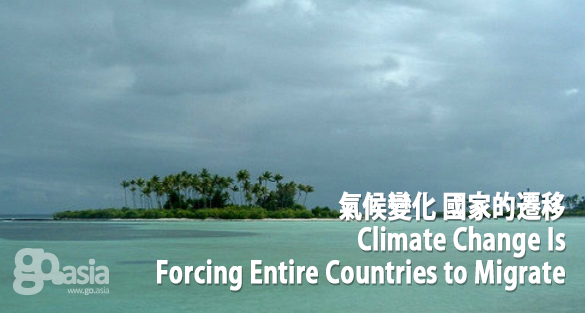Climate-forced migration yes but not in 2012? Is it really the case?
Slightly more than 100,000 people live in this country, a chain of 33 atolls in the South Pacific, about as many as live in a small American city like Erie, Pennsylvania, or Flint, Michigan. The islands lie low in the ocean, and as climate change drives the sea level higher, fewer people are going to have the option of living there. The country’s president, Anote Tong, considered surrounding the islands with sea walls or building floating platforms for his constituents to move to. But both those options are expensive, and the country’s cabinet is now backing Tong’s new plan: buy land elsewhere.
Climate-forced migration isn’t supposed to be happening yet. We’ve always thought the consequences of abusing the earth would hit our children and our children children’s in 2050 and 2100, not in 2012. That’s the easy way to think about climate change, and many Americans do. This past fall, the Yale Project on Climate Change Communication asked survey participants, “How much do you think climate change will harm future generations of people?” Forty percent responded, “A great deal.” How much did they think climate change would have their own families? Forty-eight percent of respondents thought “only a little” or “not at all.”
But families in low-lying areas like Kiribati don’t have the luxury of contemplating the fates of future generations—they must start acting now. While Kiribati is one of the larger communities that’s responding to climate pressures today, it’s not the only one. In Alaska, the thawing ground is eroding out from under coastal villages. About 2,500 Carteret Islanders are working on relocating to Bougainville, a larger island nearby. It’s harder to count the number of people migrating away from the low-lying coastal areas in Bangladesh, but there too, people are already seeking higher ground.
In many of these cases, escaping the consequences of climate change means facing new problems. Bougainville, where the Carteret Islanders could move, is still recovering from a civil war. The population of Kiribati may move to Fiji, where the government has beencurtailing civil liberties in recent years. As the former president of the Maldives, Mohamend Nasheed, found out when he considered migration, people don’t want to leave their homes: One women bit and kicked him when he suggested she might have to move to a neighboring island, he told Foreign Policy.
Climate migration can seem like a far away problem. In the Yale survey, half of respondents thought climate change would harm people in developing countries “a great deal” or “a moderate amount.” But climate change could force people in America to abandon their homes, too. This past year in Texas, as the drought wore on, towns started running out of water. These aren’t future problems; they’re current problems. And they aren’t just affecting far-off islands; they’re here, too.
Text: Jason Lam
Source of Information: GOOD










